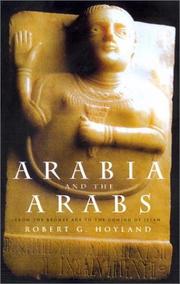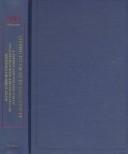| Listing 1 - 10 of 38 | << page >> |
Sort by
|

ISBN: 0860787133 Year: 2004 Volume: 18 Publisher: Aldershot Ashgate/Variorum
Abstract | Keywords | Export | Availability | Bookmark
 Loading...
Loading...Choose an application
- Reference Manager
- EndNote
- RefWorks (Direct export to RefWorks)
Dhimmis (Islamic law) --- Dhimmi --- Islamic Empire --- Empire islamique --- Historiography --- Ethnic relations. --- Historiographie --- Relations interethniques --- History of Asia --- Islam --- History of Africa --- anno 700-799 --- anno 600-699 --- anno 800-1199 --- Middle East --- Muslims --- early Islamic society --- religious communities --- Iraq --- Al-Shurut al-'umariyya --- La tashabbahu --- minority selfrule --- government control --- Christian Arabic Theologians --- Christianity --- Judaeo-Arabic texts --- Islamic dogma --- bias --- Mawlas --- slavery --- conversion --- socio-economic history --- Egypt --- the Mazdeans of Muslim Iran
Article
Abstract | Keywords | Export | Availability | Bookmark
 Loading...
Loading...Choose an application
- Reference Manager
- EndNote
- RefWorks (Direct export to RefWorks)
Book
ISBN: 9780878502103 0878502106 Year: 2015 Publisher: Princeton, New Jersey : Darwin Press, Inc.,
Abstract | Keywords | Export | Availability | Bookmark
 Loading...
Loading...Choose an application
- Reference Manager
- EndNote
- RefWorks (Direct export to RefWorks)
Muslims --- Christians --- Jews --- Islam --- Musulmans --- Chrétiens --- Juifs --- History --- History. --- Relations --- Christianity. --- Judaism --- Histoire --- Christianisme --- Judaïsme --- Middle East --- Islamic Empire --- Moyen-Orient --- Empire islamique --- Ethnic relations. --- Relations interethniques --- Christians. --- Jews. --- Muslims. --- Spätantike. --- Christ. --- Juden. --- Muslim. --- Staat. --- Politischer Wandel. --- Islamic Empire. --- Middle East. --- Naher Osten. --- Chrétiens --- Judaïsme
Book
ISBN: 9780199916368 0199916365 9780199916375 0199916373 0190209658 0190618574 1322191824 9781322191829 9780190209650 9780190618575 Year: 2015 Publisher: Oxford: Oxford university press,
Abstract | Keywords | Export | Availability | Bookmark
 Loading...
Loading...Choose an application
- Reference Manager
- EndNote
- RefWorks (Direct export to RefWorks)
In just over a hundred years—from the death of Muhammad in 632 to the beginning of the Abbasid Caliphate in 750—the followers of the Prophet swept across the whole of the Middle East, North Africa, and Spain. Their armies threatened states as far afield as the Franks in Western Europe and the Tang Empire in China. The conquered territory was larger than the Roman Empire at its greatest expansion, and it was claimed for the Arabs in roughly half the time. How this collection of Arabian tribes was able to engulf so many empires, states, and armies in such a short period of time is a question that has perplexed historians for centuries. Most recent popular accounts have been based almost solely on the early Muslim sources, which were composed centuries later for the purpose of demonstrating that God had chosen the Arabs as his vehicle for spreading Islam throughout the world. In this ground-breaking new history, distinguished Middle East expert Robert G. Hoyland assimilates not only the rich biographical and geographical information of the early Muslim sources but also the many non-Arabic sources, contemporaneous or near-contemporaneous with the conquests. The story of the conquests traditionally begins with the revelation of Islam to Muhammad. In God's Path, however, begins with a broad picture of the Late Antique world prior to the Prophet's arrival, a world dominated by the two superpowers of Byzantium and Sasanian Persia, "the two eyes of the world." In between these empires, in western (Saudi) Arabia, emerged a distinct Arab identity, which helped weld its members into a formidable fighting force. The Arabs are the principal actors in this drama yet, as Hoyland shows, the peoples along the edges of Byzantium and Persia—the Khazars, Bulgars, Avars, and Turks—also played important roles in the remaking of the old world order. The new faith propagated by Muhammad and his successors made it possible for many of the conquered peoples to join the Arabs in creating the first Islamic Empire.Well-paced and accessible, In God's Path presents a pioneering new narrative of one the great transformational periods in all of history.
Islamic Empire --- Empire islamique --- History --- Histoire --- Islamic Empire - History - 622-661 --- Islamic Empire - History - 661-750

ISBN: 0415195349 0415195357 9780415195355 Year: 2001 Publisher: London: Routledge,
Abstract | Keywords | Export | Availability | Bookmark
 Loading...
Loading...Choose an application
- Reference Manager
- EndNote
- RefWorks (Direct export to RefWorks)
Arabian Peninsula --- Arabie (Péninsule) --- History. --- Histoire --- History --- Arabie (Péninsule) --- Arabian Peninsula - History

ISBN: 0878501258 9780878501250 Year: 1997 Volume: 13 Publisher: Princeton (N.J.): Darwin press,
Abstract | Keywords | Export | Availability | Bookmark
 Loading...
Loading...Choose an application
- Reference Manager
- EndNote
- RefWorks (Direct export to RefWorks)
297 <093> --- Islam. Mohammedanisme--Historische bronnen --- Islamic Empire --- Middle East --- History --- Historiography. --- Civilization --- Asia, South West --- Asia, Southwest --- Asia, West --- Asia, Western --- East (Middle East) --- Eastern Mediterranean --- Fertile Crescent --- Levant --- Mediterranean Region, Eastern --- Mideast --- Near East --- Northern Tier (Middle East) --- South West Asia --- Southwest Asia --- West Asia --- Western Asia --- Orient --- Arab countries --- Arab Empire --- Empire, Islamic --- Muslim Empire --- Empire islamique --- Moyen-Orient --- Historiography --- Histoire --- Historiographie --- Civilisation --- Islamic Empire - History - 622-661 - Historiography --- Islamic Empire - History - 661-750 - Historiography --- Middle East - Civilization - To 622 - Historiography

ISBN: 1134646356 0203455681 1280317280 9780203455685 0415195349 9780415195348 0415195357 9780415195355 9781280317286 9786610317288 6610317283 9781134646302 9781134646340 9781134646357 1134646348 Year: 2001 Publisher: London New York Routledge
Abstract | Keywords | Export | Availability | Bookmark
 Loading...
Loading...Choose an application
- Reference Manager
- EndNote
- RefWorks (Direct export to RefWorks)
Using a wide range of sources - inscriptions, poetry, histories, and archeological evidence - Robert Hoyland explores the main cultural areas of Arabia, from ancient Sheba in the South, to the deserts and oases of the north.
Saudi Arabia --- Arabian Peninsula --- History. --- Arabian Peninsula - History
Book
ISBN: 3964568546 849192065X Year: 2019 Publisher: Iberoamericana Editorial Vervuert
Abstract | Keywords | Export | Availability | Bookmark
 Loading...
Loading...Choose an application
- Reference Manager
- EndNote
- RefWorks (Direct export to RefWorks)
Modernidad sublimada ambiciona articular una respuesta teórica a las singularidades artísticas y políticas que sostiene la producción cultural de la región rioplatense. El estudio del dramaturgo uruguayo Florencio Sánchez (1875-1910) y del argentino Roberto Arlt (1900-1942) permite elaborar la tesis de una modernidad "sublimada" (entendiéndosela desde el psicoanálisis como dinámica de desviar y diferir la pulsión) en torno a la compleja relación entre la escritura y la historia moderna de la cultura con la formación del Estado moderno regional. Las obras analizadas -leídas aquí como textos- muestran cómo la escritura sublimada se desdobla en su función cultural: por un lado es el cuerpo literario regional visible e identificable; mientras que por el otro es el "resto" histórico de disputas invisibles y ocultas. Modernidad sublimada indaga en esta dinámica de ocultamiento y aparición, señalando a ese "resto" como "goce" que, en el "acto" de recorrer, merodear, explorar o vagabundear, reactivan en el lector-espectador la performance de la escritura y su función política de rasgos regionales.
Argentine literature --- Uruguayan literature --- Argentine drama --- Uruguayan drama --- Politics and literature --- Literatura argentina --- Literatura uruguaya --- Drama argentino --- Drama uruguayo --- Política y literatura --- Literature --- Literature and politics --- Political aspects. --- History and criticism. --- History --- Aspectos políticos. --- Historia y crítica. --- Historia --- Political aspects --- Sánchez, Florencio, --- Arlt, Roberto, --- Christopherson Arlt, Roberto Godofredo, --- סאנטשעז, פלארענסיא --- סאנטשעס, פלארענסיא --- Criticism and interpretation.
Book
ISBN: 9783959941280 3959941285 Year: 2021 Publisher: Berlin : Gerlach Press,
Abstract | Keywords | Export | Availability | Bookmark
 Loading...
Loading...Choose an application
- Reference Manager
- EndNote
- RefWorks (Direct export to RefWorks)
This book offers a number of innovative studies on the three main communities of the East Mediterranean lands--Muslims, Jews and Christians--in the aftermath of the seventh-century Arab conquests. It focuses principally on how the Christian majority were affected by and adapted to their loss of political power in such arenas as language use, identity construction, church building, pilgrimage, and the role of women. Attention is also paid to how the Muslim community defined itself, administered justice, and regulated relations with non-Muslims. This book will be important for anyone interested in the ways in which the cultures and traditions of the late antique Mediterranean world were transformed in the course of the seventh to tenth centuries by the establishment of the new Muslim political elite and the gradual emergence of an Islamic Empire.
Book
ISBN: 9781463244095 1463244096 146324410X Year: 2023 Publisher: Piscataway Gorgias Press, LLC
Abstract | Keywords | Export | Availability | Bookmark
 Loading...
Loading...Choose an application
- Reference Manager
- EndNote
- RefWorks (Direct export to RefWorks)
The Life of Theodotus of Amida is that rare thing: a securely dated eye-witness account of life under Arab Muslim rule in the first century of Islam, and one of the few extant texts from seventh-century North Mesopotamia. It is imbued with local color and contemporary detail, revealing an intimate knowlredge of the terrain, its inhabitants and officialdom, as well as the precariousness of the lives of those living in the borderlands between the Byzantine and Islamic empires
Christian biography. --- Theodotus, --- Diyarbakır İli (Turkey) --- Church history. --- History. --- Theodotus ep. Amid.
| Listing 1 - 10 of 38 | << page >> |
Sort by
|

 Search
Search Feedback
Feedback About UniCat
About UniCat  Help
Help News
News